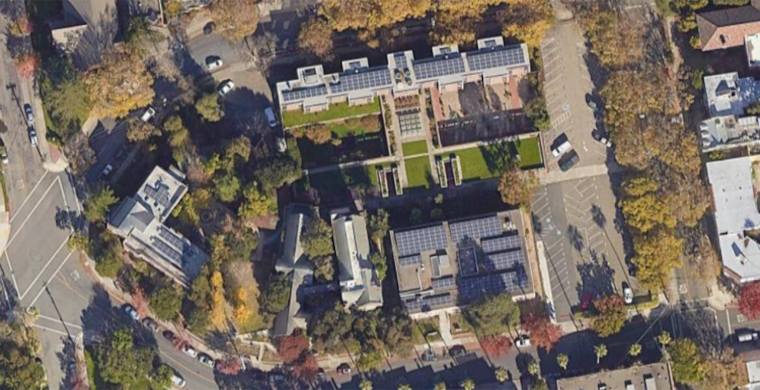CDSP: Another Episcopal Seminary to End Residential Study
By Kirk Petersen
THE LIVING CHURCH
February 1, 2023
For the second time in three months, an Episcopal seminary has announced plans to discontinue its program of full-time residential study in favor of an online hybrid model that is accessible to a broader range of potential students.
Church Divinity School of the Pacific (CDSP), the only Episcopal seminary on the West Coast, announced January 31 that it will no longer admit new residential students, and will end the residential program when the class of 2025 graduates. This follows a November 29, 2022 announcement that General Theological Seminary (GTS) in New York will no longer admit new residential students, and will continue to grant GTS degrees as essentially a subsidiary of Virginia Theological Seminary, the largest and most affluent Episcopal seminary.
CDSP is a subsidiary of a far wealthier institution: Trinity Church Wall Street, with $10 billion in assets thanks to a 1696 land grant of real estate in what came to be known as Lower Manhattan. In 2019, Trinity reached across the country to acquire the Berkeley, California-based CDSP. The Rev. Phillip A. Jackson, rector of Trinity and a CDSP alumnus, also chairs the CDSP board of trustees (which consists of the vestry of Trinity Wall Street). In announcing the change in educational model, Jackson said, “While there certainly is a continuing need for residential education, CDSP’s core strength lies in its already successful hybrid learning model.”
“This decision also reflects a recognition of what the data have been showing us for years,” said the Rev. John F. Dwyer, vice president and chief operating officer at CDSP, as quoted in the news release. “Applications for our residential programs have steadily declined and are approaching unsustainable levels. On the other hand, our hybrid M.Div. and hybrid Anglican studies programs have seen full enrollment and increasing demand.” The school has been developing online and hybrid programming for nearly a decade, a process that was accelerated by the pandemic, Dwyer said through a spokesman.
Enrollment in the fall semester of 2022 was 66 students totaling 49 full-time equivalents — almost exactly flat with the prior year. Data tables from the Association of Theological Schools for the past 20 years show a peak enrollment in 2004-2005 of 122, or 94 full-time equivalents.
Current residential students will be able to remain on campus to complete their master of divinity degrees, and will also have the option of transferring to another seminary or shifting to CDSP’s hybrid model.
Under the new model, CDSP expects to admit 12 to 15 students per year for a primarily online program lasting four years, compared with the traditional three-year residential model. Students will have intensive in-person sessions in Berkeley and in New York City. The seminary will “pause” enrollment in its master of theological studies (MTS) and certificate of theological studies programs, although students already in those programs will be able to complete them. Generally speaking, M.Div. degrees train seminarians for ordination, while the shorter theological studies programs are designed for lay vocations.
The Rev. Kyle Oliver, spokesman for CDSP, said Dwyer was unavailable for an interview because of intensive meetings with students and other constituencies regarding the announcement. The seminary’s interim president and dean, the Rt. Rev. Kirk Stevan Smith, retired Bishop of Arizona, was unavailable for the same reason. Smith has served in the interim role since the retirement of the Very Rev. W. Mark Richardson at the end of the academic year in 2022, after 11 years of service. A search for a new leader is under way, and the candidate profile has been adjusted to reflect the new direction of the school.
The transition wlll leave only four independent Episcopal seminaries that offer traditional residential M.Div. programs: Nashotah House in Nashotah, Wisconsin; Seminary of the Southwest in Austin; University of the South Theological School in Tennessee, better known as Sewanee; and VTS, based in Alexandria, Virginia.
In addition, Berkeley Divinity School is an accredited Episcopal seminary affiliated with Yale Divinity School. Students in its residential M.Div. and other degree programs receive degrees from Yale.
Other seminaries affiliated with the Episcopal Church include:
Bexley Seabury, a non-residential program housed on the second floor of Chicago Theological Seminary, which is affiliated with the United Church of Christ;
Episcopal Divinity School, the Episcopal track at Union Theological Seminary in New York, which grants degrees under the Union name.
The former Trinity Episcopal School for Ministry in Ambridge, Pennsylvania, dropped the word Episcopal from its name and is primarily affiliated with the Anglican Church in North America, although it continues to have some Episcopal seminarians.
In a statement attributed to Dwyer, Oliver told TLC by email: “As the transition to the hybrid model progresses, the space required for CDSP operations will decrease, and short-term options will be explored while a comprehensive plan is developed, with the goal of building a sustainable funding model for the seminary. If any part of the campus is sold, the proceeds from that disposition will go directly to CDSP.”
CDSP’s campus is half a dozen buildings in a large city block, located in the “Holy Hill” neighborhood, just north of the University of California at Berkeley. Holy Hill is the home of six of the eight member seminaries of Graduate Theological Union, an ecumenical consortium of seminaries with roots in the Baptist, Congregational, Lutheran, Presbyterian, Roman Catholic, and Unitarian churches. GTU was founded in 1962, and enables seminarians to take courses at UC Berkeley. The seminaries merged their collective libraries into a single collection, which has been housed since 1987 at the Hewlett Library, across the street from CDSP.














